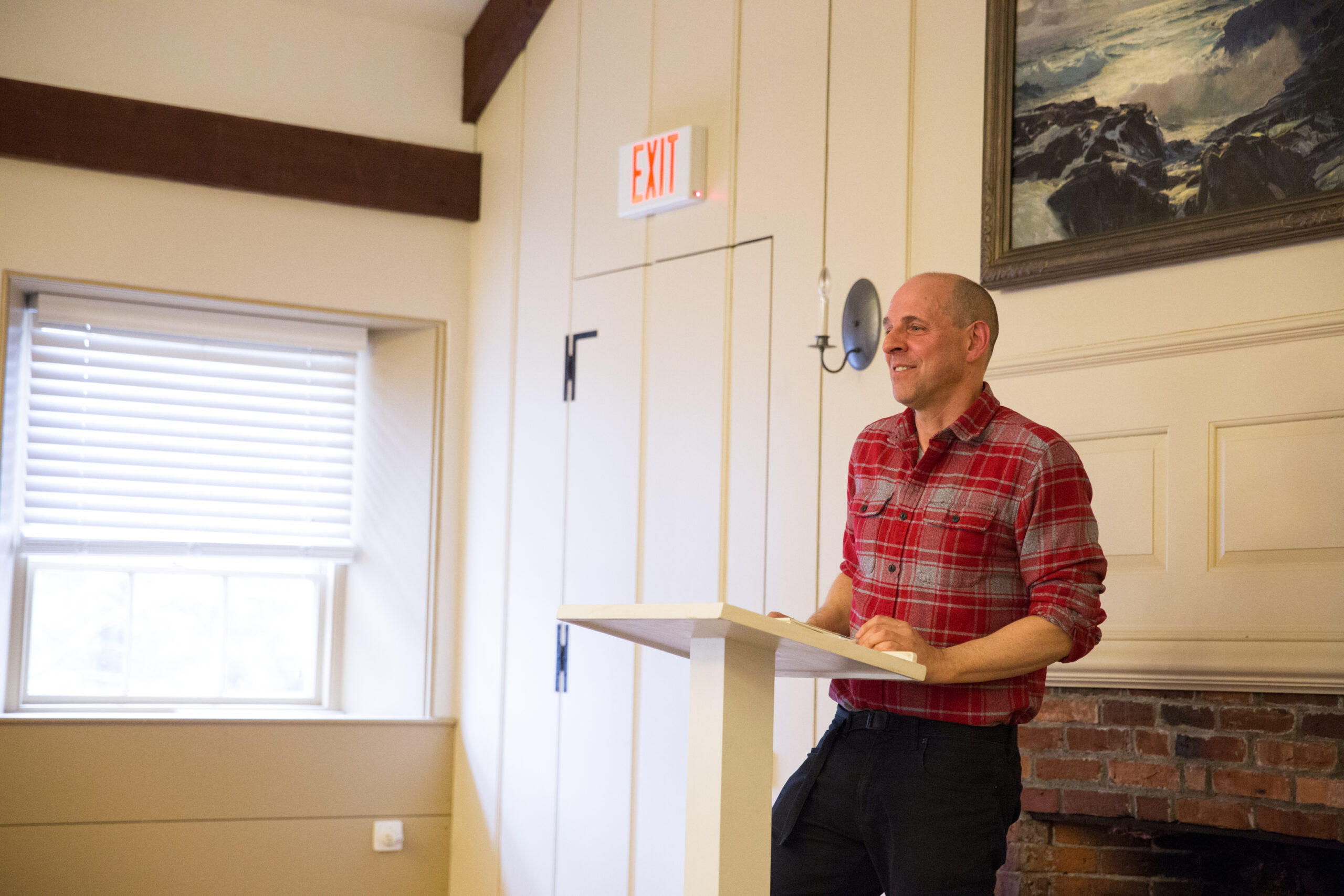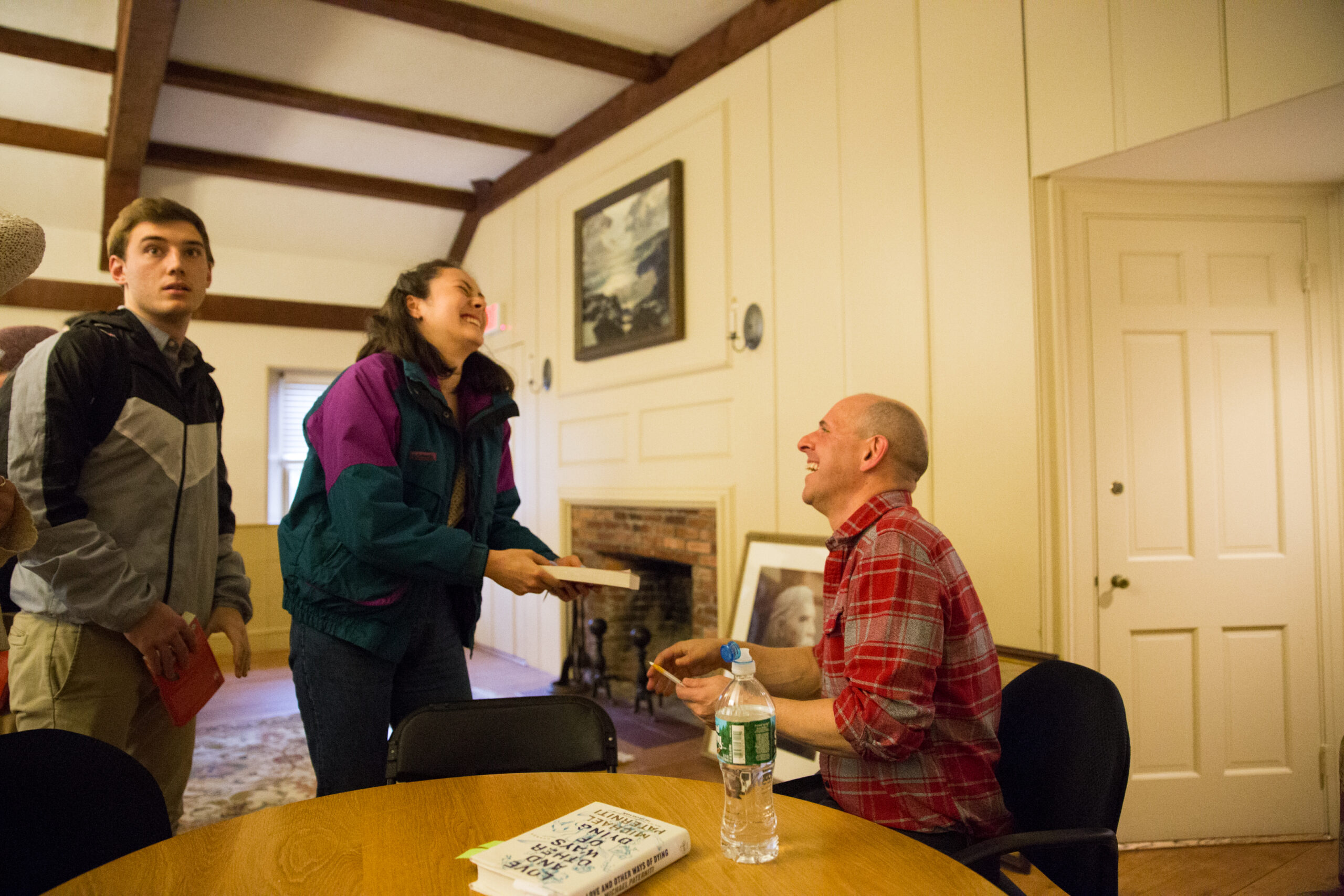Author Michael Paterniti talks process, travel and journalism
April 6, 2018
 Ann Basu
Ann BasuMichael Paterniti’s work combines storytelling in its multiplicity of forms, blurring the lines between creative writing, journalism and creative nonfiction. On Wednesday evening Paterniti visited campus to speak about his writing experience and to read from his recent collection of longform essays, “Love and Other Ways of Dying.”
Paterniti doesn’t see his work as strictly falling into any one category.
“With genre and form, I think in a very fluid way. I don’t like the demarcation,” said Paterniti during his reading.
“It should be that poetry seeps into nonfiction,” he said in an interview with the Orient. “Some of the best nonfiction I’ve read is in poetry. And some of the best reporting I’ve read is in poetry. It has a different feeling and it’s of course delivered in these truncated lines and in an idiom that’s different than you would expect, but to me, that’s what is thrilling about narrative nonfiction—I feel like there’s room to bring in all of this device and voice and storytelling illusion at the same time that you’re completely adhering to some sort of fact set.”
Now a contributing writer for the New York Times and a GQ Correspondent, Paterniti grew up in Darien, CT. Although he always knew he wanted to be a writer, Paterniti didn’t seriously start writing until after college.
“I got a job on Cape Cod working at this basically hometown newspaper and I just did everything—basically just like Wizard of Oz stuff, like ignore that man behind the curtain,” said Paterniti.
Eventually, he decided he wanted to create more permanent work.
“The paper would appear and then it would disappear, and I would just keep pouring a lot into each week and it just felt so disposable” said Paterniti. “There [was] a point where I just thought there should be more to the words and more heft and weight to the stories.”
Paterniti went on to get a Master of Fine Arts at the University of Michigan in fiction and after editing for a fiction journal and magazine, started working on his own pieces for GQ, the New York Times Magazine, National Geographic and other publications.
“I was just so desperate not to be fixing stories but making them,” said Paterniti.
Paterniti is a versatile writer who has written profiles of Hollywood celebrities like Brad Pitt and Jimmy Kimmel as well as long-form pieces delving into the issues surrounding gun violence. He reported on Columbine and spent 10 days traveling across the United States to report on mass shootings.
He recently published an article in GQ called “Dragonman, the Man Who Sells ‘People-Hunting Guns’” about Mel Bernstein, also known as Dragonman, who owns Dragonland, one of the largest firearms stores in the United States and is located in Colorado Springs, CO.
“Dragonman really connected some of these shootings to sales. People would come looking for those same weapons [used in the shootings] and there’s something very perverse to me about that and I wanted to be able to put in there,” said Paterniti. “I don’t have some strident message. My work is just to bear witness and tell the story.”
“Love and Other Ways of Dying,” which was longlisted for the 2016 National Book Award, features essays that are saturated with unique characters and themes such as love, loss and grief.
“I know that this collection could seem much funnier or much lighter. It could have been that, but these are the essays that felt like they belong together,” said Paterniti. “They are narrative stories, but they are all stories being unfolded but with an essayistic heft or meditation that goes along with it.”
Many of the stories are set in locations across the world; one story Paterniti read called “The Giant” recounts his journey to a tiny village in Ukraine to meet an eight-foot-tall man. Another, “City of Dust,” follows Frantz Termilus, the chief of the National Judicial Police, in the aftermath of the 2010 earthquake in Haiti.
“What I love about travel is everything becomes defamiliarized; the signs are not the same. I begin to see into that world what, sometimes, I can’t see into my own, because I am so used to the routines of my life,” he said. “Often, it’s easier to be triggered in these faraway places.”
Paterniti understands that even with the most personal essays he is still creating a character.
“It’s you, but the voice on the page is by necessity, a more performative voice. It has to be,” he said. “The language ends up having to be very tightly woven, and it has to be satisfying on a number of different levels, both emotional, intellectual, sensual and metaphysical.”
Currently Paterniti is working on an article about former president Jimmy Carter, who he calls the “poster child for post-presidency.” Carter teaches Sunday School at a church in his hometown of Plains, GA, where Paterniti has been travelling to get more of a glimpse into Carter’s life.
“It’s been really, really fun to do it, especially during this time when a lot of people seem to be questioning where we are going as country and some people seem to have lost hope in our current president,” said Paterniti. “It’s just been really inspiring to do it.”


Comments
Before submitting a comment, please review our comment policy. Some key points from the policy: